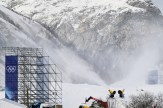London’s Heathrow Airport adding a third runway. Why is it controversial and will the UK still hit its emissions targets?
Northeastern academics look at the environmental debate surrounding the airport’s expansion and whether it could boost the British economy.

LONDON — Boston’s Logan International Airport boasts six runways and John F. Kennedy International in New York has four. But the merits of adding a third runway to London’s Heathrow Airport have been debated for at least 40 years.
Chancellor Rachel Reeves, the U.K.’s finance minister, wants to put an end to that debate. She has announced that the British government is backing the airport’s expansion in a bid to jumpstart the country’s stalling economic growth.
The Labour government says the plan of having a third runway operational by 2035 — estimated to cost upwards of £14 billion ($17.4 billion) — could create more than 100,000 jobs. Heathrow claims the extra runway — an idea first proposed in the 1980s — could allow it to increase the number of flights from its current cap of 480,000 a year to 720,000, eventually serving up to 140 million passengers annually.
Reeves has insisted the expansion can be achieved within the government’s carbon targets — the U.K. has pledged to have a net-zero carbon economy by 2050 — pointing to the “great strides” made toward “cleaner and greener aviation.”
Jonathan Rock Rokem, a Northeastern University associate professor in politics and sustainability, says the odds of greener aviation fuels being commercially viable in the next decade are slim.
“There might be some fuel efficiency that could happen — they are working on it,” says Rokem, who teaches in London. “There are various efforts to create more biofuels, to use cleaner fuels for aviation. But I haven’t seen anyone actually starting to use it commercially yet.
“It is currently a bit of a race to get there but no one knows when it is actually going to happen, so I wouldn’t put all my bets on that being the main way to grow the economy.”


But if greener plane fuel is not available in time for a third runway opening, would the U.K. be effectively ripping up its targeted reduction in carbon emissions by allowing a 50% increase in flights to the airport? Rockem thinks so.
“Unless there is a miracle and planes start flying on something else, it can’t be sustainable to expand airports based on the current carbon emissions that they are producing,” he says.
Rokem says Prime Minister Keir Starmer’s administration looks to be “in panic mode because they see growth is not happening” and officials have chosen to revisit the Heathrow project as a “good headline” designed to “get people’s attention.”
“Unless there is a miracle and planes start flying on something else, it can’t be sustainable to expand airports based on the current carbon emissions that they are producing.”
Jonathan Rock Rokem, a Northeastern University associate professor in politics and sustainability
The Labour Party won a landslide election victory in July after pledging to prioritize economic growth. But official figures show that the economy had zero growth between July and September.
As part of a package of stimulus measures announced last week, Reeves put her faith in airport expansions — with London Gatwick and Luton Airport, both situated just outside London, expected to have their expansion pitches given the green light.
Marianna Koli, professor in economics at Northeastern in London, says the British capital is already well served for passenger flights, with Heathrow one of six terminals serving the city that, taken together, provide an annual capacity that is eight times that of Logan airport.
Where a third runway could increase economic activity is in creating more takeoff and landing slots for international air freight to ease the U.K.’s post-Brexit trade issues, she argues.
“While more transport capacity can help boost trade,” Koli says, “U.K. trade is currently experiencing considerable other barriers also, predominantly from the regulatory and legal difficulties that persist after leaving the European single market.
“In this sense, to compensate for the reduction in European trade, it may make sense to create capacity for trade with other parts of the world — and in this, trade air cargo has a role to play.”
Major national infrastructure projects are not risk free — just ask Germany. Its reputation for efficiency was dented by Berlin’s Brandenburg Airport opening 10 years late and three times over budget in 2020.
Heathrow’s third runway plan arguably involves even more hurdles than Brandenburg. It requires hundreds of homes to be demolished, rivers to be diverted and the rerouting of a major motorway junction through a tunnel under the runway.
Koli says the work to develop Heathrow, which lies just inside Greater London’s southwestern boundary, risks “increased pollution on land and air,” as well as displacing parts of the community.
Locals have long opposed creation of a third runway over noise and environmental complaints, and the expansion has led to internal party struggles for Labour, with London Mayor Sadiq Khan vowing to “use any tool in the toolkit” to block the move.
Editor’s Picks
But Koli argues that Britain’s history as one of the first developed nations to industrialize means a failure to update its aging infrastructure comes with its own pitfalls.
“Infrastructure in the U.K. is in the unique position of generally being rather old compared to many other countries — partly because of its position in being the first to develop many modern types of infrastructure in the 19th and 20th centuries,” Koli explains.
“Despite the short-term challenges, it is difficult to see how any UK government can avoid infrastructure upgrades — and much of that work is likely to be somewhat disruptive. The maintenance of current infrastructure, as well as the creation of new infrastructure to cope with challenges such as climate change, is essential work.”
To ensure diggers will be “in the ground” working on the building of a new runway by 2028, Reeves has outlined a set of reforms to “speed up” the British planning system.
Rokem fears this could be a by-word for sidelinning environmental concerns about major projects like Heathrow. “The government,” he says, “looks like they want to cut red tape but at the cost of local people’s health, local people’s air quality, noise levels and so forth.
“And my feeling is — and this is my hunch, coming from a research background — that this will take much longer than the government is thinking to make it actually happen.
“But they want to make these announcements now to get people feeling like there is movement in the system because there has been a lot of stagnation.”











